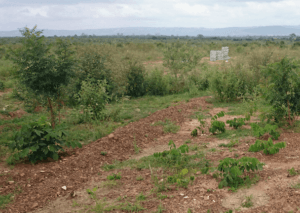Ghana Integrity Initiative calls for speedy passage of land bill
 Ghana Integrity Initiative (GII), the local chapter of Transparency International (TI) is asking the government to speed up the passage of the land bill into law.
Ghana Integrity Initiative (GII), the local chapter of Transparency International (TI) is asking the government to speed up the passage of the land bill into law.
The bill, which was first introduced in Parliament in 2018 but was later withdrawn, would be tabled again before the House this year.
It seeks to consolidate and harmonise in one simplified form, about 166 existing laws relating to land, to regulate land use and enhance effective land management in the country.
Mrs. Mary Awela Addah, the Programmes Manager of GII, said the passage of the land bill would take into account provisions that would enable the vulnerable groups, particularly women, to have access to land, thereby eliminating inequalities that exist in the land sector.
She made the appeal in Accra at a stakeholder land forum organised by the GII on the theme, ‘Role of Civil Society in Land Discourse.’
It would be recalled that since June 2015, Transparency International and its national chapters in seven sub-Saharan African countries, that is, Ghana, Kenya, Zimbabwe, Madagascar, Cameroon, South Africa and Uganda have been contributing to the German Ministry for Economic Cooperation and Development’s (BMZ’s) One World – No Hunger special initiative, through its work on The Land and Corruption in Africa (LCA).
The LCA project aims to improve livelihoods for men and women adversely affected by corrupt practices in land administration and land deals in Africa, through security of tenure as well as equitable and fair access to land in rural, peri-urban and urban areas.
The current project, which ends in December 2019, has successfully contributed to an increased awareness on land rights of citizens, empowered and given a voice to marginalized groups including widows and provided a grievance redress mechanism and corruption reporting platforms for victims and witnesses of corruption.
Corruption in land governance is commonly viewed as the abuse of entrusted power for private gain, while carrying out the functions of land administration and land management.
The forum, which brought together stakeholders such as parliamentarians, policy makers, civil society, participants from Lands Commission, traditional leaders, women groups and the media sought clarifications and discussed the current status of the land bill, how to improve dialogue on land sector reforms and build partnerships and strategies for land sector advocacy.
Mrs. Addah also appealed to civil society to adopt strategies to lobby Parliament to get the bill passed into law.
She noted that women suffered the most when there was corruption in the land sector, adding that it was high time priority was given to issues relating to land dispute and the welfare of women.
She said Ghana Integrity Initiative over the past five years, has been implementing the Land and Corruption Project(LCA), which has led to some phenomenal successes.
“This was preceded by the Women, Land and Corruption Project, which generated evidence on the interconnectivity between women, land and corruption and from that the project was born.”
Mr. Michael H. Okai, Project Coordinator, GII, who gave an overview of the LCA project, said Ghana was predominantly agrarian and that land was an indispensable asset.
On why corruption matters in the land discourse, Mr. Okai said, when corruption intertwined with gender biases in existing land tenure practices, the outcomes are hugely toxic.
He said corruption weakens land tenure security and exposes land users to increased likelihood to arbitrary displacement, often without compensation.
Mr. Francis Manu-Adabor, the Member of Parliament for Ahafo-Ano South East, and Chairman of the Parliamentary Select Committee on Lands and Forestry, urged civil society to intensify their efforts to get the House to pass the land bill.
Professor Tiah Bugri of the Department of Land Economy, Kwame Nkrumah University of Science and Technology in his presentation, said contributions of Civil Society Organisations to the development of land discourse in Ghana could not be overemphasized.
He mentioned that issues affecting Ghana’s land discourse were land tenure security, governance and environmental degradation.
Source: GNA
